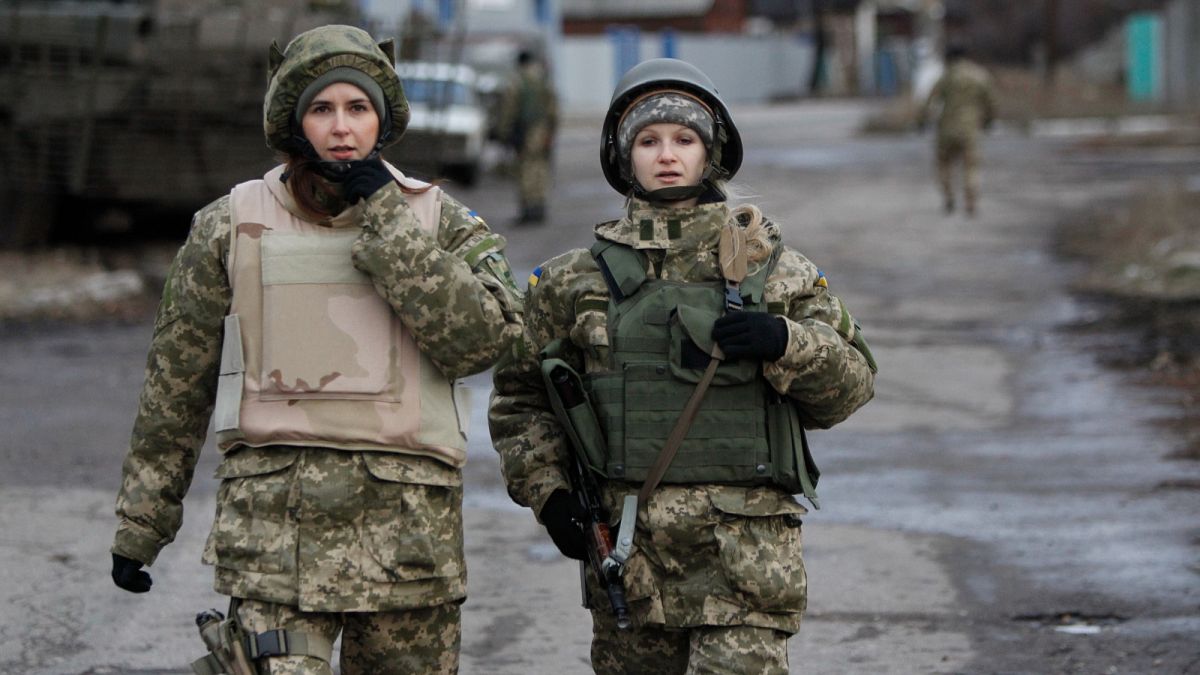Too few women participate in conflict resolution worldwide which increases the risk of certain topics being overlooked during peace talks, the NATO Secretary General’s Special Representative for Women, Peace and Security told Euronews.
“Women remain still a minority when it comes to conflict management and resolution,” Irene Fellin told Euronews on the sidelines of the Kyiv Security Forum which was held last week on the 80th anniversary of the surrender of Nazi Germany in World War II.
“What the evidence shows, the research, (is) the absence of women in negotiation leads to the fact that certain topics are less addressed,” she added.
October will mark the 25th anniversary of the adoption at the United Nations of Resolution 1325 which aimed to ensure the “equal participation and full involvement” of women in “all efforts for the maintenance and promotion of peace and security”.
Yet women represented only 16% of negotiators in active peace processes led or co-led by the United Nations in 2022, a 7 percentage point decrease from 2020. This is despite research highlighting that when women participate in peace processes, the resulting agreement is more durable and better implemented.
“The evidence shows that we still need women to have this holistic view of security needs,” Fellin said, to ensure that different perspectives are taken into account and because “space is gendered” as it is “used by the different individuals in a specific way”.
“One of the examples that I often use is about demining,” she said. “If you ask only men what areas they will want to demine, the priorities will change because they will maybe use the road from the village to the city or the space where they work, and women will maybe think where children play or where they will go to do other activities. So having this integrated approach is extremely important.”
But this can also impact how access to health, food, and the protection of children is addressed during and after the conflict comes to a resolution.
Ukraine, which has been fighting a full-scale Russian invasion for over three years, is being commended for putting accountability mechanisms in place very early on to address conflict-related sexual violence, which primarily impacts women, but also prisoners of war, who tend to be male.
“This is an extraordinary lesson that we all have to learn from Ukraine,” Fellin said.
But the increased participation of women in the armed forces – nearly 67,000 women were in the Ukrainian Armed Forces as of January 2024 – has revealed some gaps.
“One of the problems that emerged is that servicewomen were not equipped with the right combat uniform which means that women were wearing a uniform tailor-made around men’s anthropomorphic data,” Fellin told Euronews.
“When women fight and they are not comfortable they put their own life at risk, but at the same time, their operational effectiveness is limited. They are not combat-ready in that sense. So it’s very important to bring these needs into the analysis and in the way in which the respective armed forces, but also NATO, developed its capabilities,” she added.
Additionally, ongoing talks between the US and Russia and the US and Ukraine to end the war heavily skew male with few women in high-profile diplomatic positions. Meanwhile at the EU level, while the bloc’s top diplomat is a woman, Kaja Kallas, only five out of the 27 member states have foreign affairs ministers and only three, defence ministers.
Yet times of war can surprisingly open doors to women that might have been previously closed, Fellin also said.
“Looking back at history, women have changed their role during wars. It’s sad maybe to say, but wars and conflict create an opportunity to look at gender roles within the society, and they act as an accelerator. So in a way, this is an opportunity for women to take on different responsibilities.”
But it’s during peacetime that steps must be taken to increase women’s participation in diplomacy, Fellin nonetheless said.
“It’s difficult to see women in a high-level position, and as high-level mediators or diplomats If they don’t have an active role before within their society.
“What we have to build and change is creating opportunities in peacetime in all our respective countries and work on the change of mindset and to make clear how better we are, how more efficient we are in all of our decisions when women and men are equally involved in our decision-making processes,” she urged.
Read the full article here


